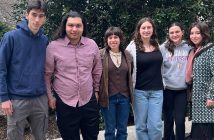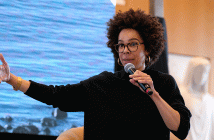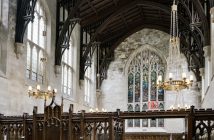 |
| Cardiff University’s Peter Edbury, a world expert on French language texts, gave the keynote. Photo by Tom Stoelker |
The Center for Medieval Studies 2014 conference, “French of Outremer: Communities and Communications in the Crusading Mediterranean,” wrapped up its annual international conference on March 30 with highlights that included a keynote by Peter Edbury, Ph.D.
Edbury, of Cardiff University, is widely considered the world expert on French language texts from the Latin East. He had just finished delivering his talk, titled, “Ernoul, Eracles and the Collapse of the Kingdom of Jerusalem,” when he gestured to the mingling crowd.
“This is the moment that’s important,” he said. “It’s stimulating and interesting to hear the papers, but a lot of the value is in the networking.”
Outremer roughly translates as “overseas” to describe the Latin Eastern states founded after the First Crusades. The French language was still young when Christians settled in areas now called the Middle East. But in Antioch, Cypress, and Jerusalem there was an explosion of prose products written in French. The texts represent a relatively new area of research, and experts from around the world gathered at Fordham Lincoln Center to hear medievlists read their latest papers.
During Saturday’s presentations, curators from the Metropolitan Museum of Art described the challenges of obtaining texts and materials for their 2016 exhibition, “Jerusalem 1000-1400.” Merav Mack, Ph.D., a research fellow from the Van Leer Jerusalem Institute and a conference attendee, offered to help.
“There are so many treasures hidden in Jerusalem and I happen to know where some of those treasures are,” she said. “The holders of libraries there, like monastic institutions and religious foundations, don’t have the same ideas of sharing knowledge like you see here [at the conference]. What this conference really manages to do is to create interlinks.”
And hyperlinks.
This the first year that the conference grew out of a digital initiative and a website, said Maryanne Kowaleski, Ph.D., the Center’s director. Laura Morreale, Ph.D., the Center’s associate director and conference co-chair, said the site will ensure that participants in the Outremer conference will have continued access to conference proceedings and information related to the Latin East, making it a “digital studies center.”
Much of the conference was live tweeted, with helpful links and comments from participants. The digital savviness at the Center is something fairly well known among those who study the middle ages. The center launched an online sourcebook in 1995.
“The digital resources are by far the most important contribution that Fordham University has given the world, and I’m saying this as an academic, not as a participant in this conference, because I don’t know the people who are doing this project,” said Mack. “But I can tell you that for my students, the translation of material into English is incredibly important. But even more important is digitizing this material and giving people access to it.”


